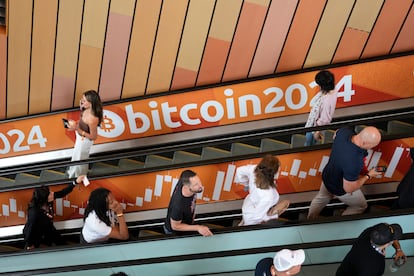Financial nihilism: The end of faith in the real value of money
More and more people, especially those between the ages of 20 and 35, are investing in cryptocurrencies. They have lost confidence in the intrinsic value of money and in the conventional ways of obtaining it

Sebastián Roca has always wanted to be rich. He’s one of those people who likes money so much that he’s willing to spend a year eating macaroni without tomato sauce or cheese, just to be able to save $1,000 a month and invest it in the stock market.
At first, he used to place his money on shares in well-known companies. Then he got bored with that. Or, to be exact, he discovered cryptocurrencies. He spent days and nights online, watching and reading everything that had to do with the subject… until it became close to an obsession. “Well, I don’t know if I would call it an obsession, but it was a very strong hobby,” Roca clarifies during a phone interview with EL PAÍS.
This happened around 2020, when he was 25 years old. He had studied Business Administration at the Autonomous University of Madrid before accepting a position at one of the main auditing firms in Spain. He came in at 9 a.m. and left at 10 p.m. In spare moments, he invested. And in a matter of weeks, he managed to double and triple the size of his bank account. He bought Bitcoin at $10,000 and sold them when it hit $30,000. He bought ether at $200 and sold it at $1,200. With his savings, instead of making a down payment on a house like so many other people would have, he reinvested the money in lesser-known cryptocurrencies and saw his account balance rise to more than $100,000, before plummeting to $20,000 during the crypto crash. “I managed to recover a little from that massive blow,” he sighs. “I’m not going to give up. It’s a risk, but in my opinion, it’s worth it.”
Roca is part of a generation that grew up watching their parents and family friends struggle to keep their homes and jobs during the 2008-2009 financial crisis. Since then, the economic situation has stabilized, but it’s far from generating enthusiasm or positive expectations among young people. Salaries in Spain have lost almost 13% of their purchasing power since the crisis, according to calculations by the economic office of the largest trade union in the country. According to the Emancipation Observatory of the Youth Council of Spain (CJE), in the second half of 2023 the average cost of housing in the Western European country (calculated based on the amount of rent paid, plus expenses on basic supplies) exceeded the average monthly salary of people between the ages of 16 and 29 by €81, or $90. In 2011, 69% of households with a head of household under the age of 35 owned their main home, while by 2022, this percentage had fallen dramatically to 32%, according to a financial survey of families. And, according to the National Statistics Institute, in Spain, the average age for becoming financially independent is now 29 years old, while the youth unemployment rate exceeds 28%. The situation certainly doesn’t seem very optimistic.
What’s to be done in this context? Some young people follow the example of their parents: work hard and save up, buy a house and create a retirement plan. But others have lost faith in the traditional methods that worked for past generations and prefer to literally gamble on their future. More and more people, especially those between 20 and 35 years of age, are investing in high-risk speculative assets, such as cryptocurrencies, NFTs, sports betting and “meme stocks,” whose value depends solely on whether an internet forum has agreed to push the price up. These alternative methods offer the possibility of high short-term returns… but also considerably higher risk.
This situation isn’t exclusive to Spain. In fact, in the United States, experts have been warning about this phenomenon for some time and have identified this behavior among young people as a symptom of what they call “financial nihilism.” The term is provocative: it suggests a loss of faith in the correct functioning of the market and in the real value of money, representing capitalism almost as a religion. For a “financial nihilist,” betting $100 that Real Madrid will win 3-2 against another team, or to invest in a cryptocurrency that they heard about on YouTube, is as valid a use of money as any other, given the questionable underlying value of the global economy. “It’s hard to fault people for wanting to get rich quick if they have lost faith in their ability to get rich slow,”concludes Andrew Edgecliffe-Johnson, in a Financial Times article dedicated to this topic.
The term “financial nihilism” was coined by Demetri Kofinas, an American economist with Greek parents. In his youth, he was a follower of the liberal economist Friedrich Hayek and the libertarian politician Ron Paul. During that period, he was diagnosed with a brain tumor and, at just 30 years old, he developed dementia. He forgot everything, to the point of having to attach his keys to his belt for fear of not being able to enter his house. Finally, he underwent surgery, and when he woke up, he learned that Donald Trump had been elected to the presidency. “I had to go back and change my entire frame of thought to understand what had happened,” he explains in a video call with EL PAÍS.
Kofinas left his old occupations behind, took a good look at the present and developed the concept of “financial nihilism,” which he used for the first time in 2020, in an episode of his Hidden Forces podcast entitled Financial Nihilism: Price Discovery in a World Where Nothing Matters. Kofinas defines this philosophy as the perception that speculative assets lack intrinsic value. That is: someone buys a cryptocurrency not because they believe in its technological potential or utility, but simply because they expect its price to rise, due to speculative demand. “We’re faced with a postmodern investment framework, where price becomes self-referential. The only thing that matters is the narrative. For financial nihilists, price is the thing itself, completely detached from any underlying reality,” Kofinas argues.
Friedrich Nietzsche announced the “death of God” as a metaphor for the disappearance of faith in absolute terms and the decline of moral order in the West, which, for centuries, was traditionally supported by Christianity. However, the God threatened by “financial nihilism” probably doesn’t reside inside churches, but on top of skyscrapers. Kofinas argues that measures taken during the 2008 financial crisis, such as bailouts for banks and the massive amounts of money that were printed for stimulus packages, have created a perception of injustice among the general population and have dismantled the “mythology of money,” by showing that its value isn’t intrinsic, but instead depends on trust and government policies. “The idea that we all play by the same rules has collapsed,” he sums up.
According to the analyst, cryptocurrencies were the “great vehicle” through which “the cancer of financial nihilism” spread. Kofinas explains that the first bitcoin followers were idealists who sought to establish an alternative, decentralized and intermediary-free monetary system, where the value of the currency wouldn’t be subject to manipulation by governments or large financial institutions.
However, since 2017, with the rise of ICOs (Initial Coin Offerings), a tool that offers investors cryptocurrencies or tokens instead of company shares, the perception of cryptocurrencies has gone from utopian to nihilistic. “Idealists have turned into speculators… and the most successful people in the crypto world have turned out to be storytellers, not engineers,” the analyst explains. “16 years after the birth of Bitcoin, who really still believes it can change the system?”

Since their emergence, cryptocurrencies have gained a reputation as being unserious investments, or “highly speculative” and “without real value,” in the words of the European Central Bank (ECB). However, despite these concerns, traditional financial markets have begun to recognize their importance. This is demonstrated by the approval of exchange-traded funds for bitcoin and ether, as well as the growing interest of institutional investors. In March of 2024, bitcoin reached its all-time high of $71,618 (currently, it sits around $59,000).
There are less dramatic interpretations of these phenomena. Juan Ignacio Crespo, a renowned economic analyst, suggests that financial nihilism could be considered a more sophisticated version of what he calls “financial hooliganism.”
“People have a natural inclination towards fun and play, which extends even to finance,” he argues. “Current economic development has allowed a greater number of people to engage in risky financial activities, which wasn’t previously possible.” Crespo adds that the economic policies implemented during the pandemic, which included significant injections of money into the economy, have provided additional liquidity that facilitates investment in speculative activities.
“There has always been a percentage of society that prefers to [go all in],” he argues. As an example, he mentions “bucket shops,” brokerage establishments from the 19th century that allowed their clients to speculate on the price fluctuations of stocks and other assets. However, these transactions weren’t actually carried out on the market. The shops functioned more like betting houses than legitimate brokerages. “Cryptocurrencies are a form of financial hooliganism taken to the extreme. Bets are no longer made on tangible assets, but on elements that lack materiality outside the digital realm. In essence, it’s more of the same, but in a renewed format,” Crespo affirms.
It doesn’t just seem like the financial market has become a kind of big casino… in many ways, it really is. Many trading applications have succumbed to the gamification trend. Users of these platforms access applications that are filled with rewards, achievements, contests, competitions, dynamic interfaces, constant notifications and social trading to connect online with other investors. Joaquín Robles, an economic analyst working at the XTB investment platform, confirms to EL PAÍS by phone that, in recent years, there has been a “clear increase” in the number of accounts opened by people under the age of 25. “Before, this was something quite unusual,” he notes.
According to Robles, these young investors plan for the short-term, have a penchant for investing in a wider variety of assets, as well as a willingness to take on greater risks in exchange for higher potential returns. Is this financial nihilism? Well, for Robles, it has more to do with what for years has been called the “culture of immediacy.”
“If [someone in their 20s] finds it hard to sit on a couch for two hours and watch a movie, it’s hard to believe that they’ll wait 10 years to get a return on an investment. You offer them a 6% annual return and they think it’s rubbish,” the analyst sums up. Additionally, these young people have high expectations about what they can earn by investing in the stock market. “This is because social media exposes them to misleading success stories. Of course, it’s possible to double the size of your bank account by investing in meme stocks or cryptocurrencies… but it’s also very possible to lose everything,” he warns.
Economist Santiago Niño-Becerra points out that, in the 1980s, there was a clear path to economic success for young workers. But today, traditional opportunities have diminished. “40 years ago, a well-prepared young person willing to work 70 hours a week and who had a few good contacts could aspire, in 10 years, to own a Porsche and an apartment in Knightsbridge (London). Not today.” As a result, many young people are turning to investments in cryptocurrencies and other high-risk assets. “Bitcoin would have failed in the 1980s, because back then, expectations were based on other things. Nowadays, you can’t make a killing in a bank… but you can dream of a few bitcoin fragments. Although none of these young people can dream of coming close to what [Warren Buffet] was,” he says.
Niño-Becerra feels that financial nihilism is an indication that the capitalist system is coming to an end, a theory that he has already laid out in his 2020 book, Capitalism (1679-2065). “The capitalist system has gone through almost all its phases and is now in decline. If the pattern that has governed economic and social systems is maintained, it’s likely to disappear sometime in the 2060s and 2070s. It may sound dramatic, but it wouldn’t be the first time this has happened in the last 2,000 years.”
Sign up for our weekly newsletter to get more English-language news coverage from EL PAÍS USA Edition
Tu suscripción se está usando en otro dispositivo
¿Quieres añadir otro usuario a tu suscripción?
Si continúas leyendo en este dispositivo, no se podrá leer en el otro.
FlechaTu suscripción se está usando en otro dispositivo y solo puedes acceder a EL PAÍS desde un dispositivo a la vez.
Si quieres compartir tu cuenta, cambia tu suscripción a la modalidad Premium, así podrás añadir otro usuario. Cada uno accederá con su propia cuenta de email, lo que os permitirá personalizar vuestra experiencia en EL PAÍS.
¿Tienes una suscripción de empresa? Accede aquí para contratar más cuentas.
En el caso de no saber quién está usando tu cuenta, te recomendamos cambiar tu contraseña aquí.
Si decides continuar compartiendo tu cuenta, este mensaje se mostrará en tu dispositivo y en el de la otra persona que está usando tu cuenta de forma indefinida, afectando a tu experiencia de lectura. Puedes consultar aquí los términos y condiciones de la suscripción digital.









































